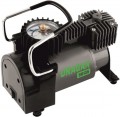Max. pressure
The maximum pressure provided by the pump or compressor — in other words, the highest tyre pressure that can be achieved using this unit.
In most models, this figure is
from 2.5 to 10 atm, and in mechanical pumps (manual and foot, see "Type") pressure of more than 10 atm is practically not found at all. This is due to the fact that even for heavy trucks, the optimal tyre pressure is usually about 5 – 9 atm (depending on a number of parameters — there are special formulas and tables for calculations); and in passenger car tyres, a pressure of more than 2.5 atm is extremely rarely used. However, there are compressors with higher pressure parameters —
11 – 15 atm,
16 – 20 atm and even
higher. The meaning of such characteristics is mainly in the "power reserve": a higher working pressure contributes to faster pumping. However, be careful not to over-inflate the tyre and damage it.
Performance
The capacity of the compressor (see "Type") is the maximum amount of air that it can pump into the tyre in a minute.
Higher performance reduces the time required to inflate the wheel; on the other hand, this parameter directly affects the dimensions, weight, power consumption and price of the compressor. So it is worth choosing according to performance, taking into account real needs. So, for a “duty” tyre inflation in a passenger car, a compressor with a low operating speed is quite enough — up to
20 L / min inclusive. And if the speed of full pumping is also important for you (for example, after replacing the rubber) — you can choose a unit for
21 – 40 L / min. In turn, models with more solid characteristics —
41 – 60 L / min and
more — are intended mainly for heavy equipment like SUVs, trucks, tractors, etc.
Separately, it should be noted that this parameter is NOT suitable for calculating the exact inflation time (even if the exact volume of air in the wheel is known). The fact is that the actual performance of the compressor is always lower than the claimed one: the figures in the characteristics are indicated for free air outlet, and when pumping the wheels, the pumping speed will inevitably be lower due to the resistance of the nipple.
Current consumption
The amount of current drawn by the compressor during operation. For most models intended for use with passenger cars, this indicator is at the level of 12-14 A. A small current consumption is preferable from the point of view of energy saving, but the performance of the device largely depends on this indicator (see "Performance").
Power
Rated power consumed by the compressor during operation.
This parameter primarily affects the features of connecting the unit to the on-board network through the cigarette lighter socket. Such a socket has restrictions on load power, and these restrictions are different for different cars; and even in the same car, different connectors — the cigarette lighter itself and a separate socket of the same format — can differ in allowable power. However, most of these connectors can easily cope with units with a power of up to 100 – 120 W; but if you get a more powerful compressor, you should clarify the possibility of using it with a specific cigarette lighter (the easiest way to do this is according to the documentation for the car). If the device is planned to be powered through "crocodiles" or from a 230 V socket (see "Connection"), you can not pay much attention to the power consumption.
Also, more powerful compressors, usually, have a greater capacity and/or maximum pressure, but there is no strict relationship here.
Autostop function
Function that
automatically stops operation when a sufficient level of tyre pressure is reached. Usually, the pressure at which the auto-stop is triggered can be set at the discretion of the user.
This function greatly simplifies the work with the pump: the risk of overfilling the tyre is reduced to almost zero, while the user does not need to monitor the pumping process, because the pump will stop at the right time. On the other hand, hitchhiking significantly affects the price. It is found only in electric compressors (see "Type").

